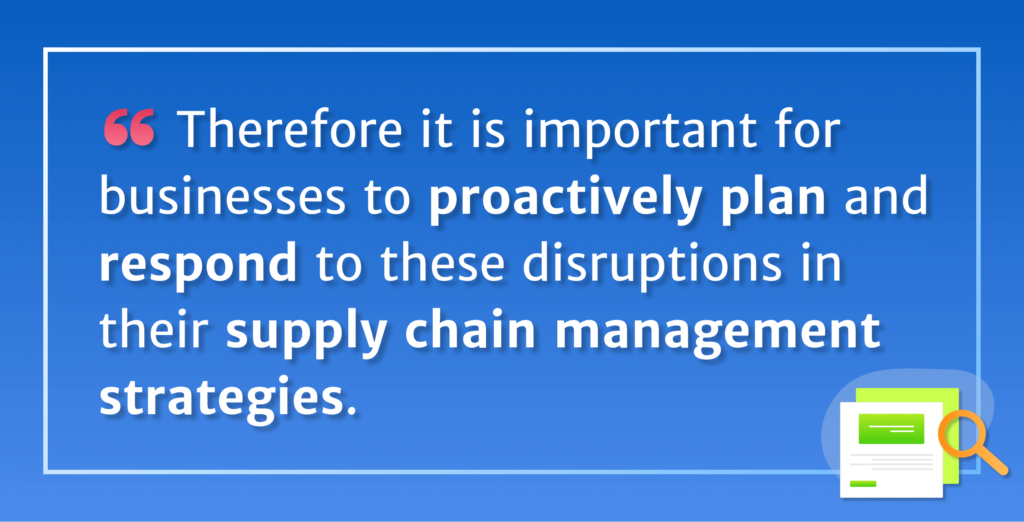Supply Chain 2024: How Chinese New Year Disruptions Affect Your Business
Blog Categories:
Published:
February 12, 2024
Reading Time:
6 minutes

China, the world’s largest manufacturer and exporter of goods, is putting its manufacturing activities to a halt as the whole country is celebrating the Lunar New Year. As China is a major actor in global supply chains, the impacts of its week-long festive holiday are profound.
The closure of factories and offices in the East Asian country leads to a temporary pause and delays in production and transportation activities. The disruption influences both Chinese suppliers and partners all over the world.
Therefore it is important for businesses to proactively plan and respond to these disruptions in their supply chain management strategies.

In this blog post, Consultport explores the impacts of the Chinese New Year on the supply chain 2024 and the strategies that businesses implement to navigate the challenges.
First, let’s have a look at the Lunar New Year timeline.
The closure of factories and offices in the East Asian country leads to a temporary pause and delays in production and transportation activities. The disruption influences both Chinese suppliers and partners all over the world.
Therefore it is important for businesses to proactively plan and respond to these disruptions in their supply chain management strategies.

In this blog post, Consultport explores the impacts of the Chinese New Year on the supply chain 2024 and the strategies that businesses implement to navigate the challenges.
First, let’s have a look at the Lunar New Year timeline.
KEY TAKEAWAYS
- The Chinese New Year officially lasts for about a week, however, factories start to slow down production and workers start leaving factories in January. This leaves a huge impact on the global supply chain 2024.
- Disrupted supply chain, congestion at ports and increased shipping costs are consequences of the week-long holiday in China, the world’s largest manufacturer, that a business should expect.
- Planning ahead, diversifying suppliers, managing inventory, and fostering close relationships with logistics partners are among the strategies that businesses implement to cope with disruptions.
When Chinese New Year Celebration Starts
The Chinese New Year, known as Lunar New Year, is a big holiday that is celebrated in many countries and territories in East Asia and Southeast Asia: China, Hong Kong, Malaysia, Philippines, Indonesia, South Korea, Singapore, Taiwan, and Vietnam.
Key dates of Chinese New Year 2024 include:

Credit: Lone Star Technology LTD
The Chinese New Year has been a “consistent source of disruption” for the international supply chain, according to an article on Linkedin about the impact of the Chinese New Year Holiday on the global supply chain 2024.
During the Lunar New Year, which falls on February 10 (Saturday) and ends on February 17, factories in this East Asian country pause their operation.
Ports also scale down their operations and a significant share of workers take one to two weeks off during the holiday. The halt in production disrupts the supply of goods and freight to the international markets.
Businesses should also expect high congestion at ports during this time.
Increased traffic and staff shortages during the holiday cause major delays in the road, rail, and aviation transportation networks. This will affect the transportation of goods to and from ports, factories, and distribution centers.

Have a good plan before and after the holiday: businesses need to have a good plan to cope with the disruption well in advance. The preparation may include forecasting the demand, maintaining communication with suppliers and manufacturers, and having a plan for inventory to meet customer demand during the holiday.
According to Forbes, firms should plan for not only before but also after the holiday as the “repercussions” of the CNY may last until spring. The magazine suggests firms have an overview of demand that includes both structured data (orders) and unstructured data (sentiment analysis).
Lone Star Technology company recommends firms evaluate and pre-book their logistics partners for availability during the holiday. The partners are assessed based on their experience, reliability and historical performance in shipment management during the Lunar New Year. The logistics providers should have sufficient resources to meet the demands and emergencies during the holiday. The company also notes that early booking is needed to ensure that the cargo is handled effectively.
Diversify suppliers: it is highly risky for businesses to depend solely on a single supplier in China during the holiday. They should diversify their network by working with suppliers from different regions and countries. This helps firms minimize the impact of disruption from a market/supplier. Firms may also consider alternative modes of transportation. For example, shift from ship to rail, or sea-air combination.
Maintain strong relationships with partners: logistic partners can help firms navigate the challenges caused by the long holiday with their insights and support. Therefore, it is necessary to invest extra time and resources to establish strong relationships with suppliers and manufacturers. This leads to better and more effective collaboration with partners in the network.
Maximize inventory management: effective inventory management is important to minimize the disruption caused by the holiday. By closely monitoring the inventory levels, firms can detect shortages and take proactive steps to maintain adequate supply. Forbes recommended that firms should “build up” the inventory in various locations and “leverage the inventory optimization planning logic” to match the demand with supply.
Maersk, an integrated logistics company, also advises businesses to leverage the use of data in inventory management. Businesses can analyze historical customer behaviors and order patterns during the Lunar New Year to make inventory planning. This helps firms anticipate the demand and ensure it has sufficient inventory for customers in case of delay in transportation.
Communicate with consumers: it is crucial to manage clients' expectations and inform them about potential delays. Firms should establish clear communication with customers and avoid the negative effects of logistical problems on customer experience.
Enhance technology integration: firms should enhance the application of technologies to track shipments. They can also consider deploying real-time monitoring systems. This will help to improve the control over the supply chain and enable businesses to respond to unpredictable scenarios.
Key dates of Chinese New Year 2024 include:
- Chinese New Year's Eve: February 9, 2024
- Chinese New Year's Day: February 10, 2024
- Chinese New Year Holiday: February 10, 2024 - February 17, 2024.

Credit: Lone Star Technology LTD
Impacts of Chinese New Year on Supply Chain 2024
Chinese New Year begins on February 10 and officially lasts for about a week. However, many offices and factories will pause for two to four weeks. This is due to a large volume of workers returning to their hometowns to celebrate the holiday with their families. Let’s have a closer look at how the Chinese New Year may affect firms.Disrupted Supply Chain
China is hailed as one of the world’s largest trade centers, especially for ocean freight shipping, therefore a slowdown in China can have an immense impact on the global supply chain 2024.The Chinese New Year has been a “consistent source of disruption” for the international supply chain, according to an article on Linkedin about the impact of the Chinese New Year Holiday on the global supply chain 2024.
During the Lunar New Year, which falls on February 10 (Saturday) and ends on February 17, factories in this East Asian country pause their operation.
Ports also scale down their operations and a significant share of workers take one to two weeks off during the holiday. The halt in production disrupts the supply of goods and freight to the international markets.
Increased Congestion, Shipping Costs
In the run-up to the Chinese New Year, companies often experience a “capacity crunch” in shipping. The demand for shipping services increases and exceeds the available capacity of shipping carriers and logistics providers. This causes a shortage of containers and leads to delays in transportation and increases in shipping costs.Businesses should also expect high congestion at ports during this time.
Increased traffic and staff shortages during the holiday cause major delays in the road, rail, and aviation transportation networks. This will affect the transportation of goods to and from ports, factories, and distribution centers.
How Businesses Prepare for the Supply Chain 2024
First businesses need to be well aware of the holiday schedule and take steps to minimize the impacts of manufacturer closures during the holiday. The strategies to cope with the supply chain challenges include:
Have a good plan before and after the holiday: businesses need to have a good plan to cope with the disruption well in advance. The preparation may include forecasting the demand, maintaining communication with suppliers and manufacturers, and having a plan for inventory to meet customer demand during the holiday.
According to Forbes, firms should plan for not only before but also after the holiday as the “repercussions” of the CNY may last until spring. The magazine suggests firms have an overview of demand that includes both structured data (orders) and unstructured data (sentiment analysis).
Lone Star Technology company recommends firms evaluate and pre-book their logistics partners for availability during the holiday. The partners are assessed based on their experience, reliability and historical performance in shipment management during the Lunar New Year. The logistics providers should have sufficient resources to meet the demands and emergencies during the holiday. The company also notes that early booking is needed to ensure that the cargo is handled effectively.
Diversify suppliers: it is highly risky for businesses to depend solely on a single supplier in China during the holiday. They should diversify their network by working with suppliers from different regions and countries. This helps firms minimize the impact of disruption from a market/supplier. Firms may also consider alternative modes of transportation. For example, shift from ship to rail, or sea-air combination.
Maintain strong relationships with partners: logistic partners can help firms navigate the challenges caused by the long holiday with their insights and support. Therefore, it is necessary to invest extra time and resources to establish strong relationships with suppliers and manufacturers. This leads to better and more effective collaboration with partners in the network.
Maximize inventory management: effective inventory management is important to minimize the disruption caused by the holiday. By closely monitoring the inventory levels, firms can detect shortages and take proactive steps to maintain adequate supply. Forbes recommended that firms should “build up” the inventory in various locations and “leverage the inventory optimization planning logic” to match the demand with supply.
Maersk, an integrated logistics company, also advises businesses to leverage the use of data in inventory management. Businesses can analyze historical customer behaviors and order patterns during the Lunar New Year to make inventory planning. This helps firms anticipate the demand and ensure it has sufficient inventory for customers in case of delay in transportation.
Communicate with consumers: it is crucial to manage clients' expectations and inform them about potential delays. Firms should establish clear communication with customers and avoid the negative effects of logistical problems on customer experience.
Enhance technology integration: firms should enhance the application of technologies to track shipments. They can also consider deploying real-time monitoring systems. This will help to improve the control over the supply chain and enable businesses to respond to unpredictable scenarios.
Conclusion
Chinese New Year is a joyous time that is widely celebrated in many Asian countries. Traditions, feasts and quality time with family and friends are all that workers anticipated for the whole year. However, for international partners that link with China in the global supply chain, the holiday can bring about challenges.
Having a sound understanding of the impacts of the Chinese New Year on supply chains 2024 is crucial for businesses to proactively respond to the challenges. Effective strategies that involve effective planning, inventory management, and supplier diversification are essential to mitigate the disruptions.
At Consultport, our talented consultants have helped firms solve their critical supply chain management challenges whether it is about enhancing the efficiency of the supply chain processes, digitalization in the supply chain, or JIT inventory management. Don’t hesitate to reach out to us and together we elevate your performance to new heights.
Having a sound understanding of the impacts of the Chinese New Year on supply chains 2024 is crucial for businesses to proactively respond to the challenges. Effective strategies that involve effective planning, inventory management, and supplier diversification are essential to mitigate the disruptions.
At Consultport, our talented consultants have helped firms solve their critical supply chain management challenges whether it is about enhancing the efficiency of the supply chain processes, digitalization in the supply chain, or JIT inventory management. Don’t hesitate to reach out to us and together we elevate your performance to new heights.
Share This Story, Choose Your Platform!



